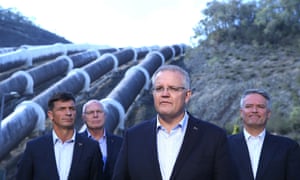Mathias Cormann says Coalition will ‘finalise longer-term target in time for Cop26’ but Angus Taylor commits only to ‘long-term strategy’
Senior Morrison government ministers are publicly at odds about whether Australia will take a long-term emissions reduction target to global climate talks in November after Labor unveiled a target of net zero emissions by 2050.
On Friday the finance minister Mathias Cormann confirmed the government “will be finalising a longer-term target in time for Cop26” but the emissions reduction minister would commit only to “a long-term strategy” despite repeatedly being asked about a new target.
As revealed by Guardian Australia, Anthony Albanese used a speech to a progressive thinktank on Friday to commit the ALP to adopting a net zero target by 2050 if it wins the next federal election, without the use of carryover credits from the Kyoto period.
Scott Morrison is holding off from making a commitment to carbon neutrality by 2050, partly because of an internal brawl within the Coalition and partly because the prime minister says Australia should not sign up to targets in the absence of costings.On Friday the finance minister Mathias Cormann confirmed the government “will be finalising a longer-term target in time for Cop26” but the emissions reduction minister would commit only to “a long-term strategy” despite repeatedly being asked about a new target.
As revealed by Guardian Australia, Anthony Albanese used a speech to a progressive thinktank on Friday to commit the ALP to adopting a net zero target by 2050 if it wins the next federal election, without the use of carryover credits from the Kyoto period.
Some in the government have noted publicly in recent weeks that Australia implicitly accepted the net zero pathway when the Coalition signed and ratified the Paris agreement, and Liberal moderates are now pushing to make net zero an explicit target beyond the 26-28% emissions reduction promised by 2030.
Asked about the existing Paris commitment on Friday, Cormann told Sky News “we will be finalising our longer-term emissions reduction target in time for Cop26 in Glasgow later this year”, using the word “target” at least three times in his formulation of future government policy.
“But what we will do as part of our process is to ensure that the agenda we determine to achieve any such target is environmentally effective and economically responsible,” he said.
“And we will ensure that we can look the Australian people in the eye and say ‘this is what we’re aiming to achieve, this is what it will mean for electricity prices, this is what it will mean for jobs’.”
Cormann accused Labor of committing to targets without setting out the cost, warning that Albanese is “making the same mistake” as former leader Bill Shorten.
Later on Friday, Angus Taylor told Sky News the Coalition had a “very clear target for 2030” and a “very clear view that will drive emissions [reductions] beyond 2030”.
Taylor repeatedly avoided the question about whether a technology roadmap to reduce emissions would result in a new longer-term emissions reduction target.
“What we’ve said is we’ll have a long-term strategy and we’re not going to have any target that is uncosted, unfunded [and] unplanned,” he said. “We’re not going down that path.”
“We’ve made very clear that we’re focused on a long-term strategy and technology will be the focus of it … not taxes.”
“We are working towards a long-term strategy, a technology investment roadmap, we have a target for 2030, we’re going to meet and beat that target.”
Despite the Coalition criticism, business rode to Labor’s defence. Australian Industry Group chief executive Innes Willox said the net zero target “is increasingly widely supported by Australian businesses, industry advocates such as Ai Group, the wider community and governments of all complexions”.
“That growing consensus is important to guide and discipline the development of efficient, trade neutral and fair policies to get there,” he said.
“We shouldn’t underestimate the challenge of net zero, which goes well beyond generating cleaner electricity.
“Nor should we get too hung up on economic projections, which are about as reliable as trying in 1990 to estimate the cost and value of smartphones in 2020.”
Every state and territory has expressed at least an aspirational objective of achieving net zero emissions by 2050, and Australia has been urged by the UK and its Pacific neighbours to sign up to that target.
Albanese noted on Friday that the Business Council of Australia is calling for it as well as major corporates including AGL, Santos, BHP, Amcor, BP, Wesfarmers and Telstra.
“Seventy-three countries, including the UK, Canada, France and Germany, many with conservative governments, have already adopted it as their goal,” he said. “Australia should too.”
Earlier, Labor’s climate change spokesman, Mark Butler, told Radio National the opposition would set out a detailed policy about how to achieve targets and its cost “well before” the next election.
Butler argued that the cost of reducing emissions should not be divorced from the cost of inaction and noted Melbourne University research had found actions to reduce emissions have a benefit cost ratio of 20 to one.

No comments:
Post a Comment